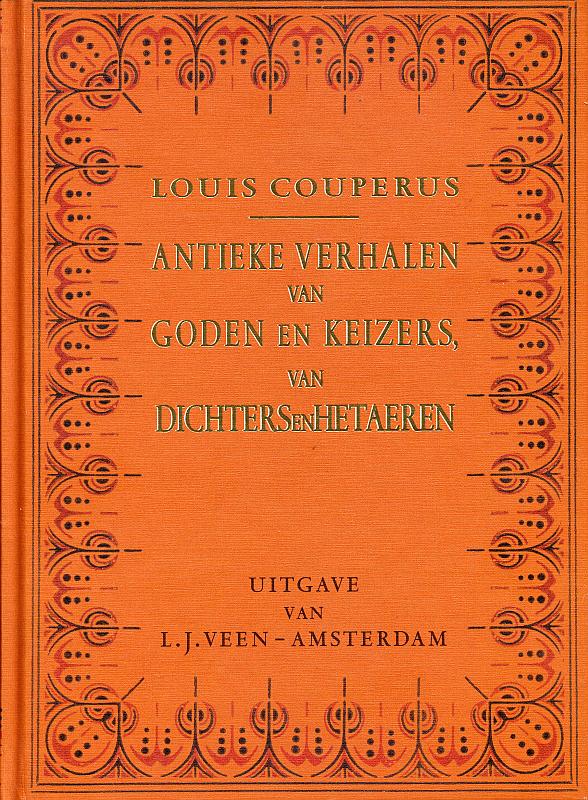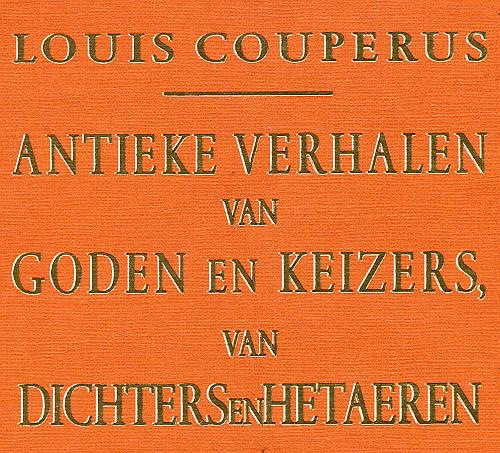| Author | Louis Couperus |
|---|---|
| Title | De dood van Vesta |
| First published | 1911 |

Louis Marie-Anne Couperus (1863-1923) was an important (and prolific) Dutch novelist. He travelled extensively and moved often. He lived in Holland, Dutch Indies, France, and Italy, but always considered his birth place The Hague his home town: Zoo ik iets ben, ben ik een Hagenaar, if I am anything at all, I am a Hagenaar (someone from The Hague). Several of his novels deal with former expatriates, returned from the Dutch Indies and now living in The Hague.
De dood van Vesta (The death of Vesta) is a short story, set in ancient Rome in the time of emperor Theodosius. Theodosius has made Christianity the official state religion, and the old pagan religion withers.
Vesta was the virgin goddess of the hearth, and custodian of the eternal flame, the sacred fire brought by Aeneas from Troy to Rome. This fire was not permitted to go out, or a nationwide disaster would follow. The fire was preserved in the state-funded temple of Vesta, and tended by the Vestals, six virgins chosen by lot from Roman girls between six and ten years old who had to spend at least 30 years in the service of Vesta (and usually stayed the rest of their lives).
When the story begins, the temple of Vesta is crumbling, and the last virgins have grown old and died – only one, old and ill, is left now to guard the fire. When she dies, the fire will extinguish, the goddess Vesta herself will die, and disaster will befall Rome.
Couperus, not a fan of Christianity, clearly laments the withering of paganism. In De dood van Vesta, Christians still fear Vesta, the fire, and the curse of the last Vestal. Pagans see Christianity as a passing fad and hope (expect) that their religion will revive. The vestal virgin has no hope: Not only the religion, but the gods themselves wither and die, and many gods are already dead. She laments, with Couperus, the new religion that is replacing the old (and true) religion. She knows she can’t protect her religion (or the flame that symbolizes it) much longer.
De dood van Vesta was published in 1911, as part of the short story collection Antieke verhalen van goden en keizers, dichters en hetaeren (Antique stories of gods and emperors, poets and hetaerae). As far as I know, these stories were never translated into English.
Links:
- Zoo ik iets ben, ben ik een Hagenaar, blog post on Haagse Prenten (in Dutch)
- Louis Couperus society (in Dutch)
- Louis Couperus at Amazon
- Theodosius at Wikipedia
- Vesta’s fire at Wikipedia
De dood van Vesta was read as part of the 2007 Once upon a time challenge.

It’s a pity this is not available in English, it sounds really interesting.
Henk, it’s good to meet up with you again after the Classics Challenge. I think it’s wonderful how these challenges bring together people from all over the world. Just looking over your blog and trying to wrap my mind around the idea that we are all exposed to so many different life styles, books, etc. and yet we bond for a moment on the internet.
I’d love to read this in English, too. Thanks for the tease, er, review!
I see I now need to hook up with some Dutch speaking people as I am too impatient to learn a new language *G* ****CV
For me English..is quite good to use for comunication..other language ..some..it’s make me blank..
But you have a great blog..my friend